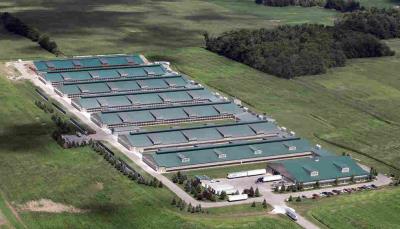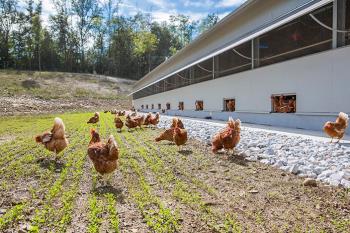|
The Organic Livestock and Poultry Practices Rule (OLPP), that was intended to establish standards for organic production, was signed into effect during the last hours of the Obama Administration in January 2017 by then Secretary of Agriculture Tom Vilsack. The incoming Secretary of Agriculture, Dr. Sonny Perdue, successively delayed implementation of the Rule and on March 13th 2018 issued a final withdrawal notice which terminated the initiative.
The Organic Trade Association initiated litigation to reverse the USDA decision. After considerable delays requested by USDA, the U.S. District Court for the District of Columbia has ruled that the USDA now has 180 days to rectify errors in economic models and to return to the Court with a defense.
|

Organic Farm with aviaries and sun porches |
The Organic Trade Association stated “At the end of the day, and despite this delay, we are more confident than ever that our lawsuit will prevail and that the will of the industry will be served. We are confident that the Organic Livestock and Poultry Practices Rule will be reinstated.”
The OLPP mandated extensive outside access for egg-production flocks. This requirement would have disqualified most in-line egg production units that use sun porches as a substitute for outside access.
 From the perspective of biosecurity, hens should not have outside access to pasture as they are vulnerable to infections including avian influenza carried by migratory waterfowl and are susceptible to infection with Salmonella and parasites.
From the perspective of biosecurity, hens should not have outside access to pasture as they are vulnerable to infections including avian influenza carried by migratory waterfowl and are susceptible to infection with Salmonella and parasites.
If the OLPP rule is reinstated, the contribution of organic eggs from large in-line aviary units without outside access will cease, resulting in escalation in the price of organic eggs. The industry will predictably respond by developing a new category of ‘GMO-free’ eggs that will effectively satisfy the majority of current organic customers, but at a far lower price.
The OLPP rule may reemerge irrespective of lawsuits and court decisions in 2020, if there is a change in Administration, since the industry can expect a reversion to the previous policy favoring “family farms”. This would be unfortunate for both producers and consumers as eggs produced under the proposed OLPP Rule would retail for over $6.00 per dozen compared to certified organic eggs fron in-line units currently retailing for approximately $3.75 per dozen in club stores. Organic eggs under the strengthened OLPP Rule would have no quantifiable quality or nutritional benefit over eggs from hens held in aviaries and allowed access to protected sun porches.